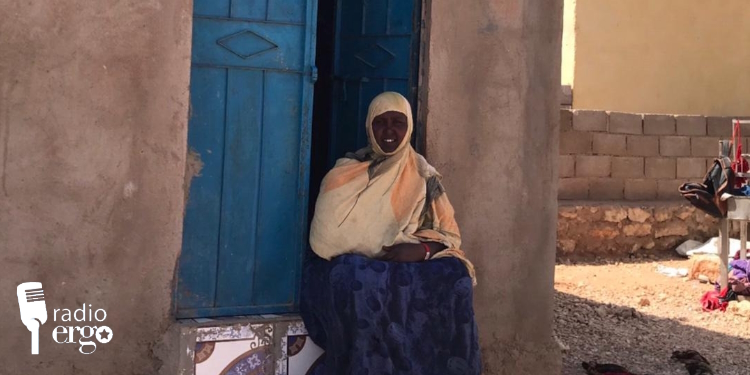
One thousand internally displaced families in Garowe, capital city of Puntland in northeastern Somalia, have been moving in to permanent homes on a resettlement site, offering them a fresh start after years of hardship in makeshift camps.
Each family received a stone-built house with a toilet, located on a 169-square-metre plot of land in Hoodaale. The housing development was opened in December.
Meymun Abdi Abdullahi, 36, her five children and husband had been evicted three times from Jillab IDP camp after being unable to pay the $5 monthly rent charged by the landowner.
“We were living in a flimsy hut where I feared thieves at night and worried that the house could catch fire if we left it unattended. During the rainy season, I was constantly anxious because the house couldn’t withstand the flooding and rain. Now, when it rains, I feel happy because we have a house to shelter in,” said Meymun.
As well as poor shelter, they had to pay $0.10 for a 20-litre jerrycan of water. They now get free water as well as other services in the settlement.
“Now, we receive free healthcare services. There are clinics where patients can get all the medicine they need, and there’s a police station for handling conflicts. A school has also been prepared, and we’re waiting for teachers to arrive. This place has greatly improved our quality of life,” said Meymun.
The family arrived in Garowe in 2018 after losing 100 goats to drought in the rural areas of Nugal region.
With services now provided, Meymun can focus on securing food for her family. She runs a small tailoring business at home with a sewing machine she received in the camp and makes $5-7 a day.
“I sew clothes to buy tea, and buy milk. I have become self-reliant. Life is better than it was before because having a home makes it easier to tackle other challenges. In the past, I was too discouraged to work,” she said.
The Hoodaale Resettlement Programme, funded by the World Bank, was implemented by Garowe’s local government in partnership with the International Organisation for Migration and Norwegian Refugee Council.
Sahro Mohamed Adan said this was the first time she had owned permanent property in Garowe after 20 years living in displacement camps, paying $5 rent for a flimsy shack.
“Today, I no longer worry about rent or water. In the camp I was relocated from, I gave birth to seven children while paying rent. When I couldn’t pay, we’d be locked out and we had to sleep in a house without a door. We are free from that suffering now,” said Sahro.
Sahro continues to face financial struggles, as she sells snacks and food on the streets while her husband earns $5-10 a day when he gets labour jobs on construction sites.
Deqo Mohamed described the joy at being chosen to receive her first proper home with access to water and healthcare.
“Vulnerable families with many children were prioritised. The area I lived in before had no access to healthcare, water, or toilets. It was a difficult life, but now that hardship is over,” she said.
Deqo, who moved to Garowe in 2017 after losing 150 goats to drought, noted that food shortage was her family’s biggest challenge since last July, when a $80 monthly allowance from WFP stopped.
“We don’t have a stable source of income. We rely on the little help we get from others. My husband and I don’t have jobs. We used to receive aid cards, but now things are very tight,” said Deqo.
Garowe’s municipal secretary, Mohamud Ali Hasan, said the resettlement programme would help the families recover economically and adapt to urban living conditions.
Source: Radio Ergo

Leave a Reply